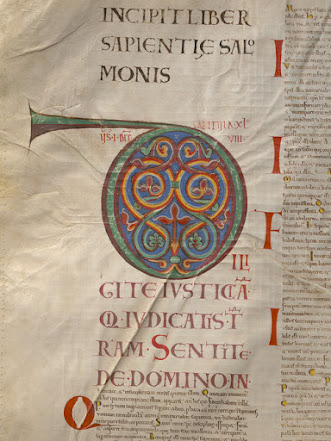Jesus answered them,
“Is it not written in your law, ‘I said, ‘You are gods”‘?
This Scripture passage did not mean to imply that people were actually gods. And yet, it was not for nothing that the word was used. There was a real though limited way in which those described were exercising an authority which was divine, the abuse of which power was all the worse precisely because of that origin. Scripture did not waste words. Nor was the use of 'gods' mere hyperbole. It allowed those who read it to contrast what the flawed human attempts to wield divine authority with what it might look like if one who was God in truth and in fullness did so.
I said, “You are gods,
sons of the Most High, all of you;
nevertheless, like men you shall die,
and fall like any prince (see Psalm 82:6-7).
What would it be like if there was one like God, a Son of the Most High, who never showed injustice, partiality or wickedness, who always rescued the weak and the needy from the hand of the wicked? What if there was one who had true knowledge and understanding, who did not walk in darkness, because he himself was the light of the world? The psalm Jesus quoted did not make these questions explicit, but it could create an implicit possibility in the back of one's mind, 'What if?' The only thing that could fulfill the flawed human prototype was something beyond what anyone could have asked or imagined. It may have been possible to read past it, surrendered to the fact that it was simply not meant to be. Yet the very fact that it was something according to the divine intention that was thus unfulfilled seemed to leave room for hope that it could be so, somehow, someday. Such a preparation would be important, because the Judeans correctly understood the shocking claim Jesus made:
“We are not stoning you for a good work but for blasphemy.
You, a man, are making yourself God.”
Perhaps the citation of the Scripture by Jesus at least slowed them down in their rush to condemnation. It was unlikely to explain everything or in itself bring about conversion. But maybe it opened the hearts of one or two to the possibility that there was more to Jesus than a mere blasphemer. Perhaps there were a few who entertained at least the possibility that there could be more to the identity of Jesus than that of a mere man, more to the God of Israel than the unapproachably divine. Because it was the case that the whole identity of the people Israel was meant to be the preservation of the holiness of their God, they had every reason to be cautious. Yet we see in Scripture that their had in fact been hints foreshadowing Jesus, preparing the people for his incarnation.
Importantly, Jesus did not leave his testimony at the level of words only. The words would soften hearts to receive the truth of his works. His works, especially the ultimate work of his resurrection, would give proof and assurance to his words.
If I do not perform my Father’s works, do not believe me;
but if I perform them, even if you do not believe me,
believe the works, so that you may realize and understand
that the Father is in me and I am in the Father.
The claim of Jesus was hard for a people with a specific, fixed view of monotheism to receive. But even we ourselves are sometimes slow to recognize how it can be that someone could be both Son of God and Son of Man. We tend to emphasize one or the other as our preferences dictate. Jesus wants us to understand that he is both of these perfectly and at once, without conflict. If we do realize this we can avail ourselves of his divine presence even in the must human and mundane circumstances. When we face trials, we can face them together with one who understands them, because he was similarly tested. We can face them with one who empathizes with us and trust in his power to bring us through. Further, we can begin to understood what it might look like to fulfill our own destiny as sons and daughters of the Most High.
But the LORD is with me, like a mighty champion:
my persecutors will stumble, they will not triumph.

No comments:
Post a Comment